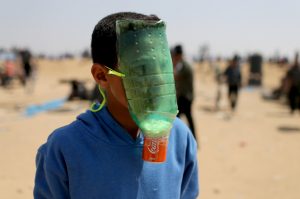
By Nidal al-Mughrabi
GAZA BORDER (Reuters) – Israeli forces shot and wounded at least 40 Palestinian protesters on Friday, Palestinian medics said, as thousands converged on Gaza’s border with Israel and set fire to mounds of tires to launch a second week of demonstrations.
Twenty Palestinians have died since the demonstrations near the heavily guarded Gaza border fence began on March 30, the latest a man who died in a Gaza hospital on Friday of gunshot wounds suffered on the first day of protests.
Five of Friday’s 40 wounded were in critical condition, according to the Gaza health ministry.
Palestinian tent encampments have sprung up a few hundred meters (yards) back from the 65-km (40-mile) frontier but groups of youths have ventured much closer, rolling tyres and throwing stones towards Israeli troops.
The demonstrators are pressing for a right of return to what is now Israel for refugees – and their descendants – from the 1948 war surrounding the country’s creation. Refugees comprise most of the 2 million population of Israeli-blockaded Gaza, which is ruled by the Islamist militant movement Hamas.
“I, like everyone around here, am coming to liberate their land,” Hekam Kuhail, 60, told Reuters, flashing a v-for-victory sign and having her photograph taken near the border.
With black tyre smoke and Israeli tear gas rising into the air, Palestinian youths used T-shirts, cheap medical masks and perfume to try and protect themselves. Israel was also trying to douse burning tyres with fire hoses from its side of the border.
The Israeli military has stationed sharpshooters on its side of the frontier to deter Palestinians from trying to break through the fence into Israeli territory. Many of those killed were militants, according to Israel.

A Palestinian protects himself from inhaling tear gas at the Israel-Gaza border during a protest demanding the right to return to their homeland, in the southern Gaza Strip April 6, 2018. REUTERS/Ibraheem Abu Mustafa
CRITICISM OF SHOOTING AT DEMONSTRATORS
Seventeen of the 20 Palestinian dead were killed by Israeli gunfire on the first day of protests a week ago, medics said. The deaths drew international criticism of Israel’s response, which human rights groups said involved live fire against demonstrators posing no immediate threat to life.
The United Nations human rights office urged Israel to exercise restraint.
“We are saying that Israel has obligations to ensure that excessive force is not employed. And that if there is unjustified and unlawful recourse to firearms, resulting in death, that may amount to a wilful killing. And that’s a grave breach of the Fourth Geneva Convention,” U.N. human rights spokeswoman Elizabeth Throssell said in Geneva.
Israel says it is doing what it must to defend its border and that its troops have been responding with riot dispersal means and fire “in accordance with the rules of engagement”.
An Israeli military spokesman said on Friday that the army “will not allow any breach of the security infrastructure and fence, which protects Israeli civilians”.
Hamas spokesman Hazem Qassem urged protesters to keep rallies peaceful. “Maintaining the peaceful nature of the protests will strike all fragile Zionist propaganda,” he said.
The Israeli government has ruled out any right of return for Palestinian refugees, fearing that the country would lose its Jewish majority.
The United States has criticised protest organisers. “We condemn leaders and protesters who call for violence or who send protesters – including children – to the fence, knowing that they may be injured or killed,” President Donald Trump’s Middle East peace envoy, Jason Greenblatt, said on Thursday.
The protest action is set to wind up on May 15, when Palestinians mark the “Naqba”, or “Catastrophe”, when hundreds of thousands fled or were driven out of their homes during violence that culminated in war in May 1948 between the newly created state of Israel and its Arab neighbours.
(Additional reporting by Eli Berlzon and Amir Cohen on the Gaza border, Stephanie Nebehay in Geneva; writing by Stephen Farrell and Ori Lewis; editing by Mark Heinrich)